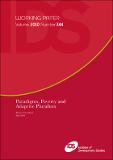| dc.description.abstract | In earlier analysis, two paradigms were identified in development
professionalism, thinking and practice: one, often dominant, associated with
things; and one, often subordinate, associated with people. Current
development thinking and practice have diverged into two clusters, with
procedures associated with the paradigm of things imposed by powerful actors
and organisations in tension and contradiction with participatory methodologies
(PMs) associated with the paradigm of people. A binocular vision sees both.
This sets out to see further, and whether participatory methodologies (PMs)
can bridge these binaries with both – and complementarities and win-wins.
In recent years, PMs have proliferated. Contributing factors have been the way
methods have multiplied, their versatility, adaptability and combinability, the
explosion of applications of Information and Communication Technologies and
Web 2.0, and more speculatively an increase in the number of people working
in a creative participatory way. PMs that combine methods have proved
increasingly versatile and adaptable to contexts and purposes.
PMs are well suited to understanding and expressing the local, complex,
diverse, dynamic, uncontrollable and unpredictable (lcdduu) realities
experienced by many poor people. These contrast with the controlled
conditions and universalities sought in much high status professionalism.
Paradigmatically and practically, four domains have increasingly converged and
cohere: PMs; poor people’s lcdduu realities; technology; and complexity.
Paradigm can then be defined as a coherent and mutually supporting pattern
of: concepts and ontological assumptions; values and principles; methods,
procedures and processes; roles and behaviours; relationships; and mindsets,
orientations and predispositions. Empirically, a paradigm of adaptive and
participatory pluralism can be inferred from experience and examples. This fits
with the realities of poor people as adaptive agents and with PMs seen through
lenses of technology and complexity. It contrasts with a paradigm of neo-
Newtonian practice.
Adaptive pluralism embraces, underpins and expresses ideas and practices of
reflexivity, continuous learning, value and principle-based eclectic
improvisation, co-evolution and continuous emergence. Conceptually, it
embodies paradigmatic synergies. Practically, it offers win-win solutions and
generates an agenda for action. | en_GB |

